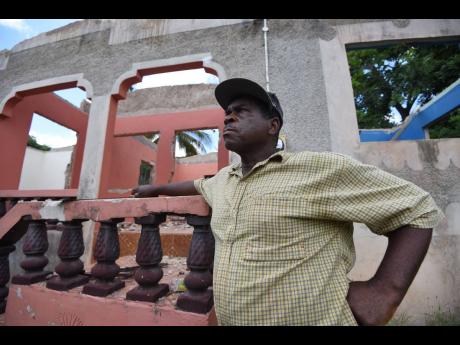Highway robbery?
Public defender probes Manchester land buys as farmer cries foul
George Thomas said he has been bowled a curve ball after signing documents in a rush to sell his house for $8 million, only to discover that the sum he received to accommodate construction of the May Pen to Williamsfield leg of Highway 2000 was...
George Thomas said he has been bowled a curve ball after signing documents in a rush to sell his house for $8 million, only to discover that the sum he received to accommodate construction of the May Pen to Williamsfield leg of Highway 2000 was heavily underpriced.
The St Toolies, Manchester, farmer has reported the circumstances surrounding the sale of the property to the Office of the Public Defender, which is now investigating the matter.
Public Defender Arlene Harrison Henry told The Gleaner on Monday that what has been done to Thomas was “appalling and disgraceful”.
“That is a matter under deep scrutiny. That is a matter that our office is willing to offer legal aid assistance to protect his constitutional right to land,” the public defender charged, hinting that she would widen her probe to include other acquisitions in the project dogged by controversy.
The row offers insight into the explosive conflicts that have scarred the highway development, with countless complaints - from dust nuisance to land grabs – by rural folk of being steamrolled by technocrats and an army of bulldozers.
On Friday, Thomas told The Gleaner that the National Road Operating and Constructing Company Limited (NROCC) had written to him indicating that the Government would acquire his land for the Highway 2000 1C project.
“Mr So-and-So came and said they are not going to worry move me, they are going to take a piece of the property,” he said.
However, Thomas said he was in shock when a representative from NROCC returned and told him that the Government would take all of his property.
A teary-eyed Thomas, who has farmed all of his life, said: “Him tell mi say mi must tek off the housetop. Him a move by force how him talking to me.”
He said the NROCC representative made it clear that if he did not remove the roof of the house, he would not be paid for the property.
Thomas said he took up a few citrus, flowers and bananas and other persons came and helped themselves with some of the remaining crops.
But Thomas appeared not to understand the complexity of the legal paperwork, a not-uncommon problem in farming districts like St Toolies and Redberry.
“I am not satisfied. Dem give me a paper to read, but a read, but tru him come and shatter mi nerves, truly I don’t understand. Afterwards mi get to understand that mi sign mi death warrant,” Thomas told The Gleaner.
He recounted that his brother raised an alarm, saying that he had sold his property “too cheap”.
Thomas said he was paid $825,000 for his cultivation and plants, an amount he now believes was insufficient.
The farmer told The Gleaner that he did not know he was signing the document for the sale of the house.
“When him come, him just deh pon haste,” he said of the NROCC representative.
Pulling up roots and displaced from his home, Thomas is now living in a rented house.
Phillip Myers, senior manager of land acquisition at NROCC, described the claims made by Thomas as “highly erroneous”.
“I do know that Mr Thomas has literacy issues and I became aware when I was delivering the offer when he passed it to a cousin to read it for him,” Myers told The Gleaner on Monday.
“When I delivered the offer letter, I did not immediately require Mr Thomas to sign saying that he was accepting. I left it with him to take counsel and to make other considerations that were contained therein the offer letter,” Myers added.
The NROCC land acquisition manager said he has written to the public defender about the issue.
Myers said he was surprised that the matter was being discussed in the press having not received an official response from the public defender.
Asked if the property value was $13 million, Myers said he did not see an “appraisal for that kind of money”.
However, he said he was not in office and, therefore, could not provide the price of the land.
But the public defender is arguing that Thomas had a decent house.
“People have made decent livelihoods and it is an appalling disgrace that those people would be disposed of their lands,” Harrison Henry said.
“In many instances, they are ancestral lands. Lands that people born on, grow on, grandfather, grandmother, they have graves on it, and it is a disgrace when we go in and break up these communities and leave these people without a livelihood.”
Harrison Henry made it clear that she was not against the construction of highways, but noted that NROCC had not given valuation reports to property owners of many tracts of land it had acquired.
The public defender revealed that the owners of lands transferred by ancestral bequeathal and which have been compulsorily acquired for the highway project have been told that they would not be compensated until they present government-issued titles.
“That is unfair! It is a gross violation to those people’s rights to own land because they are the undisputed owners,” Harrison Henry said.
She said that the Office of the Public Defender would meet with the residents impacted by the highway project in Manchester. Harrison Henry also committed to her office assisting the residents to get their titles.

